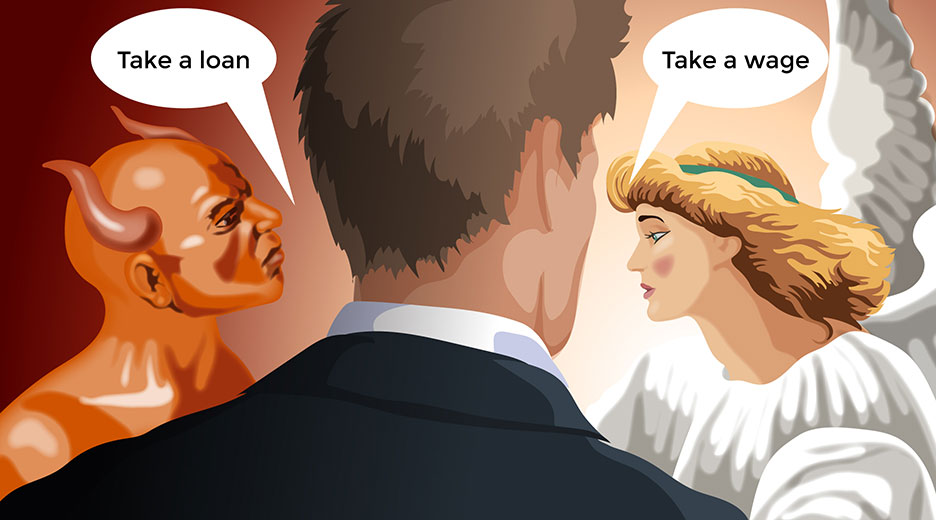Are Directors’ Salaries ‘Voidable Transactions’ in a Winding Up?
Directors often fail to pay themselves a salary before winding up. Instead, many small and medium-sized enterprise (SME) directors pay themselves throughout the lifetime of a company by withdrawing cash that is accounted for in a company loan account. In doing so, directors often seek to delay the payment of the income tax (PAYG) that they would have to pay if they drew a salary.

This is a dangerous move if a company is in financial distress. In this article, we explain why this is risky, why directors should ensure that they are paid a salary and what the effect of the ‘voidable transaction’ provisions of the Corporations Act 2001 (Cth) (‘the Act) might have on payments to directors.
Background on director salaries prior to liquidation
In an insolvent liquidation, within the pool of unsecured creditors, employees have priority for recovering funds from the business under section 556(1)(e) of the Act (read more about the priority of creditors in a winding up at The Ultimate Guide to Liquidation Part 2: Preparing for Liquidation).
However, under that section, directors are classed as ‘excluded employees’. This means that their entitlements are capped at $2,000 for wages/ super and $1500 for accrued leave. This is an intentional policy decision to penalise and prevent working directors from claiming their salary after a liquidation ends from company asset resources.
In addition, directors are not eligible for the Fair Entitlements Guarantee (FEG) Scheme that provides time-limited unpaid wages and benefits for employees who are out of pocket after a winding up.
In light of this, directors should actively consider ensuring that their company pays them a regular salary during financial distress. This is a more prudent move than the director supporting their lifestyle via a loan account, which is fully payable on winding up. More on this below.
Are directors’ salaries voidable as unreasonable director-related transactions, uncommercial transactions or unfair preferences?
The Act provides that certain transactions that occur prior to winding up may be ‘clawed back’ (are voidable transactions) by the liquidator. Significant forms of voidable transaction include unreasonable director-related transactions (section 588FDA of the Act), uncommercial transactions (section 588FB of the Act) and unfair preferences (section 588FA of the Act):
- A liquidator can apply to the court to void a payment to directors or their associates if it is considered an ‘unreasonable director-related transaction’. It is usually not unreasonable to pay employees (including directors) a regular salary prior to a winding up. Directors (especially SME directors) provide valuable services to the company which should be compensated like any other employee. However, in order to ensure that a transaction is not an unreasonable director-related transaction, it is important to establish a regular salary for the director over a long period. A large lump sum shortly before liquidation could raise questions of reasonableness and lead to a finding of an unreasonable director-related transaction.
- A payment from a company to another party whilst it is insolvent, or causing it to become insolvent, may be voidable where a reasonable person in the company’s circumstances would not have entered into it, taking into account the benefits and detriments of doing so. This is known as an ‘uncommercial transaction’. On the face of it, there is nothing ‘uncommercial’ or commercially unreasonable about a company paying a director a regular salary.
- A liquidator can apply to the court to void a transaction where it constitutes an ‘unfair preference’ to one creditor over others, relative to what they would get in a winding up. In the usual course of business, an employee is not a creditor of their employer (this changes only on winding up). Therefore, regular payment of director salaries will not constitute an ‘unfair preference’.
Could payments through director loan accounts be voidable transactions?
As mentioned, many directors forgo some portion of their salary and draw down on the business as a loan, in order to minimise PAYG income tax.
However, unlike regular salary payments, drawing from a loan account shortly before winding up does put the director in the position of creditor and could constitute an unfair preference.
Depending on the circumstances of the payment (such as its size and timing), drawing from a loan account could also be interpreted as an unreasonable director-related transaction or an uncommercial transaction. In short, it is debatable whether a reasonable person in the company’s position would make a payment in that way.
What should directors do before an insolvent winding up?
Directors should be aware that liquidators are not required to give comprehensive advice on the impact their appointment will have on the director (ie. that any existing loan accounts will be ‘called in’ on winding up). This is because, in an insolvent winding up, the liquidator is required to be independent and does not have a fiduciary relationship with the director.
Instead, where a business is in financial difficulty, a director should engage a professional bookkeeper to check the accounts and do a writeup. They should also consider engaging a lawyer to determine their legal position. If there is unpaid salary, the director should get professional advice on whether it can be drawn down without being found to be an unreasonable director-related transaction.
However, it is most important that a company sets up appropriate payment and bookkeeping practices well in advance. Money paid to a director should be properly split between a Division 7A loan account (they may also need to sign a contract) and salary (with payslips and proper records). If payment to a director fall outside the scope of these two types of transactions, mere payments could be deemed to be an unreasonable director-related transaction and recoverable for creditors.